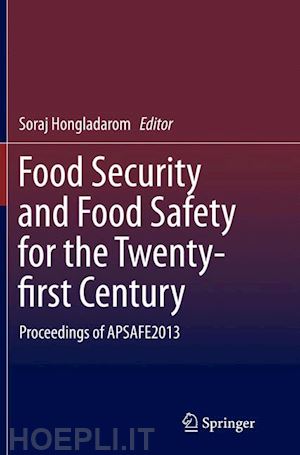
Questo prodotto usufruisce delle SPEDIZIONI GRATIS
selezionando l'opzione Corriere Veloce in fase di ordine.
Pagabile anche con Carta della cultura giovani e del merito, 18App Bonus Cultura e Carta del Docente
Chapter 1: Can Food Science Reduce World Hunger?.- Part I: Production and Consumption.- Chapter 2: No Food Security without Food Sovereignty.- Chapter 3: Ethical Values of Food Safety.- Chapter 4: Current Situation on Food Additives in Thailand: Use and Awareness.- Chapter 5: The “Monsantonization” of Agriculture.- Chapter 6: Rural Infrastructure and Gender Inequality in Agribusiness Development (A Case of Batu, East Java Province, Indonesia).- Chapter 7: Use of Indigenous Filipino Food Ingredients in Processed Meat Products.- Chapter 8: The Future of Livestock: Feeding the World Sustainably and Humanely.- Chapter 9: Impact of Processing on Pesticide Residues in Vegetables.- Chapter 10: Sodium Content of Snack Food and Ethical Considerations Pertaining to its Distribution in Schools.- Chapter 11: The Effect of Organic and Inorganic Fertilizer on Production, Sesame Seed Oil Content and Feasibility in Sandy Coastal Land.- Chapter 12: Water Balanced Analysis for the Determination of Available Growing Season at sub-Watershed, Loa Janan, East Kalimantan.- Chapter 13: The Right to Organic/Ecological Agriculture and Small-Holder Family Farming for Food Security as an Ethical Concern.- Chapter 14: Pre-HACCP As a Management Development Tool Toward Achieving Food Safety Standard: Thailand’s Experience.- Chapter 15: Ethical Reflections on the Process of Food Production in China.- Part II: Distribution and the Environment.- Chapter 16: Sucked into the Global Vegetable Oil Complex: Structural Changes in Vegetable Oil Supply Chains in China and India, Compared with the Precedents in Japan.- Chapter 17: Presentism as an Embedded Temporal Value of Modernity: An Analysis of the Modern Food System from the Energy Perspective.- Chapter 18: The Reality of Food Deserts in a Japanese Big City and their Resolution using Urban Agriculture.- Chapter 19: Choosing our Food Futures through Participation?: A Critique of ‘Scenario Workshops’ in Lofoten.- Chapter 20: What Are the Moral Codes for Seed-Saving?: From the Interviews with the Practitioners in Japan.- Chapter 21: Management, Food Preparation and the Ethical Dimension at the Khao Kaewsadet Education Centre.- Chapter 22: Intellectual Property Rights and Food Security: The Role of External Relations.- Chapter 23: The Holistic Ethics of Sustainability.- Chapter 24: Biosphere and Syntropy - What has Forestry to do with?.- Chapter 25: The Case of Biwako Quasi-National Park: An Analysis of Sustainability and Development.- Chapter 26: Influence of Differences between Western and Eastern Philosophy Thoughts on Ethics of Genetic-Modified Foods and Crops.- Chapter 27: Arthropod Pest Management in Sustainable Agricultural Systems.- Chapter 28: Japanese Consumers' Altruistic Attitude and Food Choice: Two Years after Fukushima Accident.
Soraj Hongladarom is an associate professor of philosophy at Chulalongkorn University in Bangkok, Thailand. He has published books and articles on such diverse issues as bioethics, computer ethics and the roles that science and technology play in the culture of developing countries. His concern is mainly on how science and technology can be integrated into the life-world of the people in the so-called Third World countries and what kind of ethical considerations can be obtained from such relation. A large part of this question concerns how information technology is integrated in the lifeworld of the Thai people and especially how such integration is expressed in the use of information technology in education. He has organized the second and third Asia-Pacific Computing and Philosophy conferences at Chulalongkorn University in 2005 and 2007. His works have appeared in The Information Society, AI & Society, Philosophy in the Contemporary World and Social Epistemology, among others.











Il sito utilizza cookie ed altri strumenti di tracciamento che raccolgono informazioni dal dispositivo dell’utente. Oltre ai cookie tecnici ed analitici aggregati, strettamente necessari per il funzionamento di questo sito web, previo consenso dell’utente possono essere installati cookie di profilazione e marketing e cookie dei social media. Cliccando su “Accetto tutti i cookie” saranno attivate tutte le categorie di cookie. Per accettare solo deterninate categorie di cookie, cliccare invece su “Impostazioni cookie”. Chiudendo il banner o continuando a navigare saranno installati solo cookie tecnici. Per maggiori dettagli, consultare la Cookie Policy.